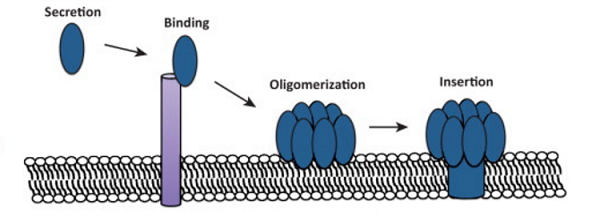Introduction
Exotoxins e.g. Staphylococcus aureus
Endotoxins e.g. Salmonella sp.
Invasion of host tissue e.g. Mycobacterium tuberculosis
Introduction
Bacteria can cause disease (become pathogenic) when they invade the interface between an organism and their environment. This could be the skin, lungs, digestive system, etc. There are two ways which you need to know about in which pathogens cause disease:
1) damage to the cells, and 2) producing toxins.
The damage caused can be a byproduct of their normal growth and division, as they destroy host tissue and disrupt the host’s healthy structure and function. For example, bacteria that cause tuberculosis destroy lung tissue and therefore compromise the host’s ventilation ability. Cholera bacteria on the other hand produce toxins which cause excessive water to be drawn into the intestine from cells by osmosis, casing great water loss through diarrhoea.
Let’s read a few more details about the specific kinds of bacteria toxin and tissue damage in 3 case studies: Staphylococcus aureus, commonly found on skin, Salmonella sp. (species) that can be the source of food poisoning, and the aforementioned Mycobacterium tuberculosis which is passed between infected individuals.
Exotoxins e.g. Staphylococcus aureus
Staph. is commensally (safely) found on around a third of all people. The most common pathogenic breakouts are in the form of skin or tissue infection such as boils of the skin, infection of the deep layer of skin called cellulitis (not to be confused with cellulite which is a normal condition of fatty tissue) and impetigo. More rarely, these superficial infections can penetrate deeper, infect blood (bacteremia) and cause organ infection and damage (endocarditis).
Exotoxins are substances actually excreted by bacteria actively to invade the host tissue and wreak havoc. There are many different kinds by Staph. aureus, such as protein barrels that integrate into the plasma membrane of host cells and cause their contents to leak out through these huge pores created by the barrel shape.

